The Mundane
During March 2022, I followed Randall Sorensen, 33 yr old Boulder County arborist, to capture an embodied view of his life. We lived next door to each other, and his existence was known because of the constant chainsaw noise, where he would mill wood in the backyard. His passion is trees and the outdoors where he finds solitude in the mountains nearby. He climbed all 14ers in Colorado, and his new goal is to climb all the 13ers. This gallery captured the mundanity of his life: where he works and struggles with addiction. Outside of the mundane, his parents’ also hosted a birthday dinner for him.
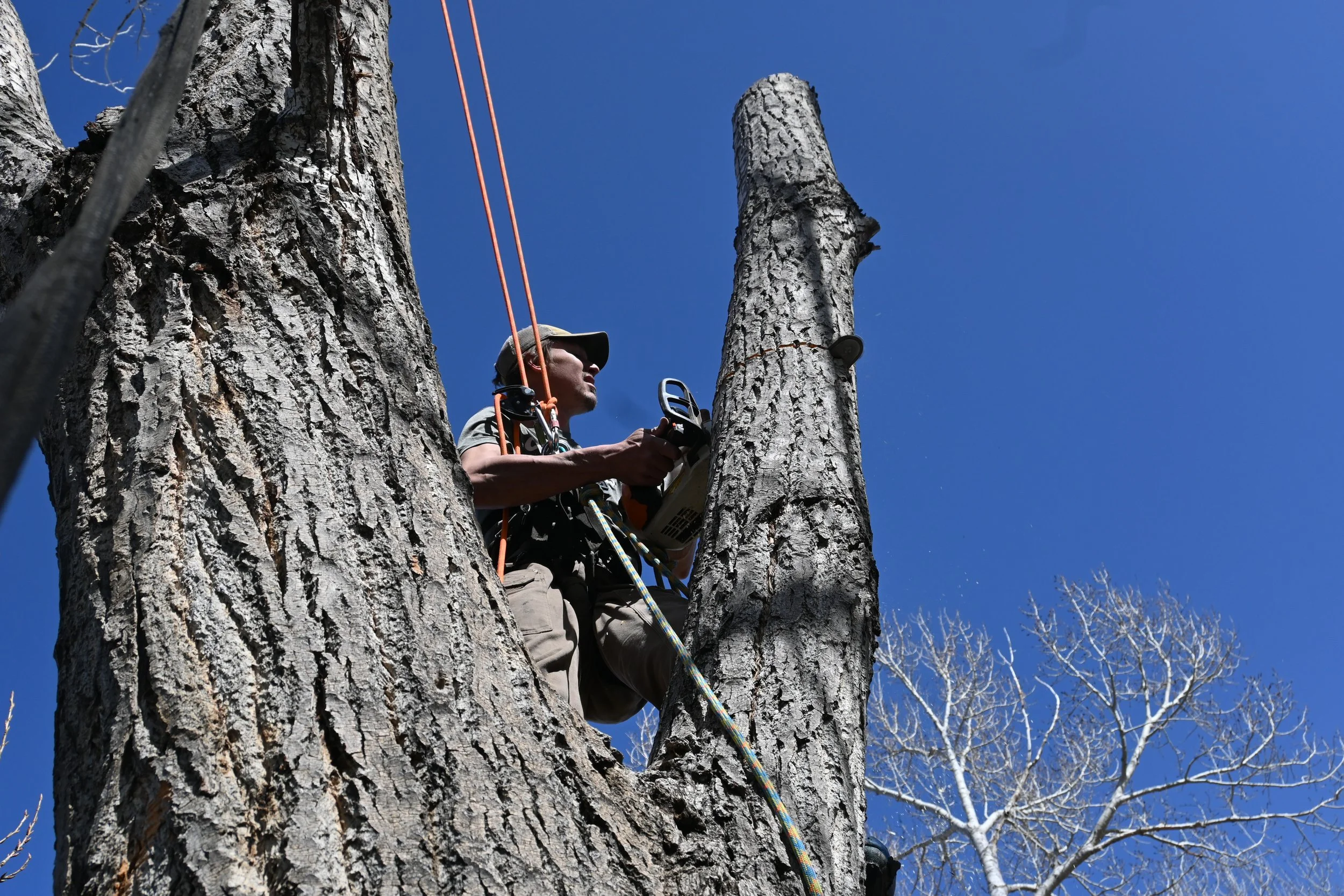
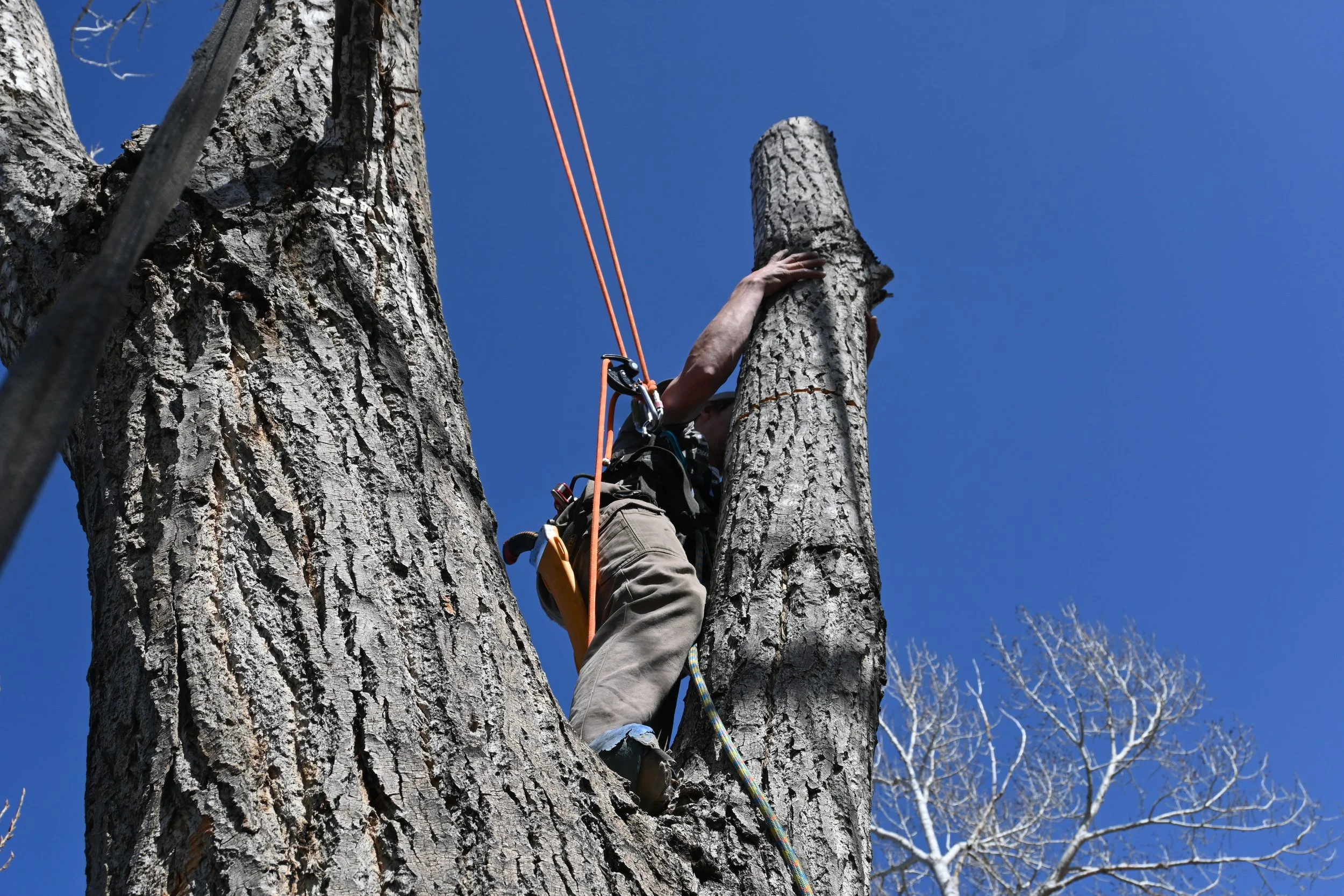
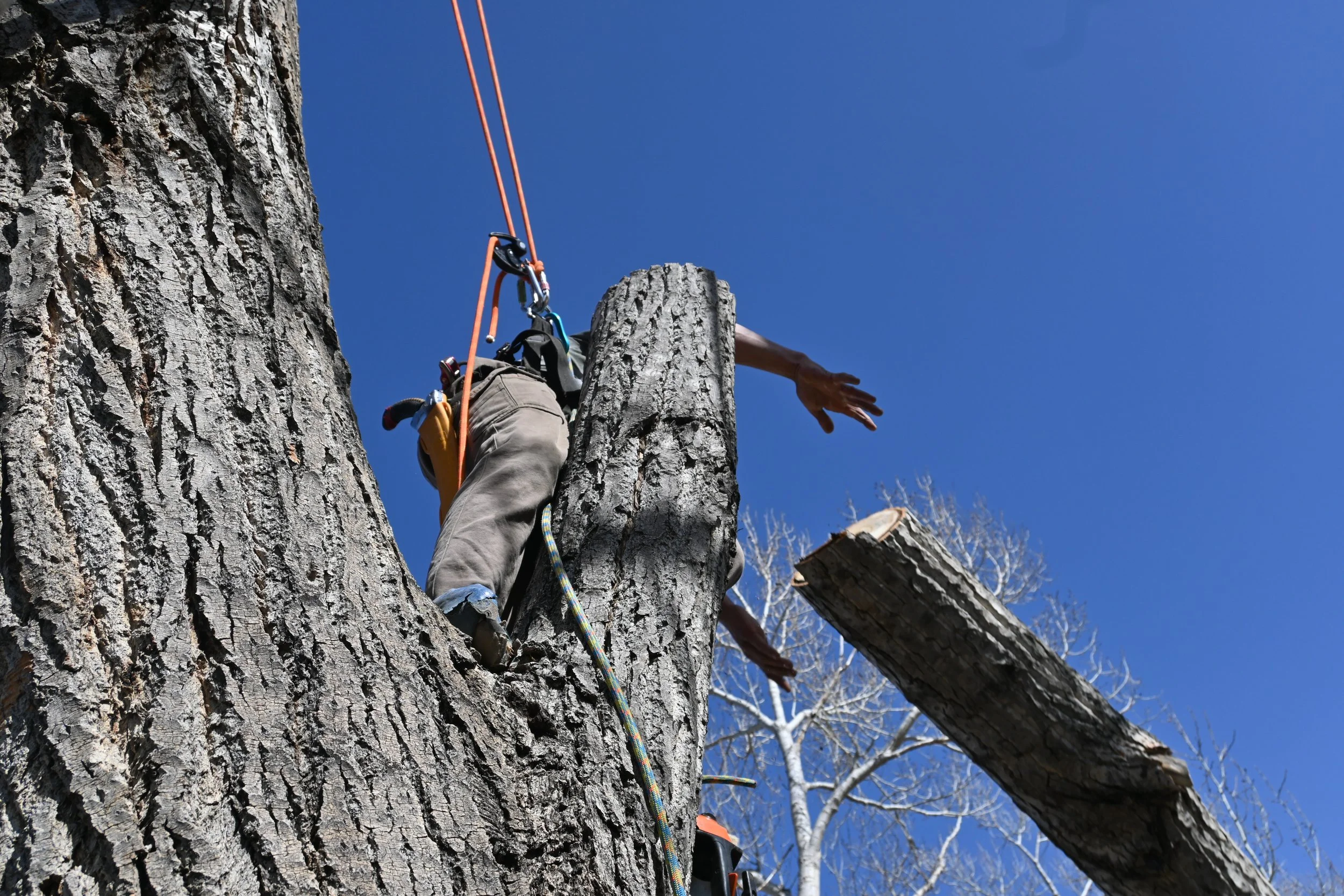
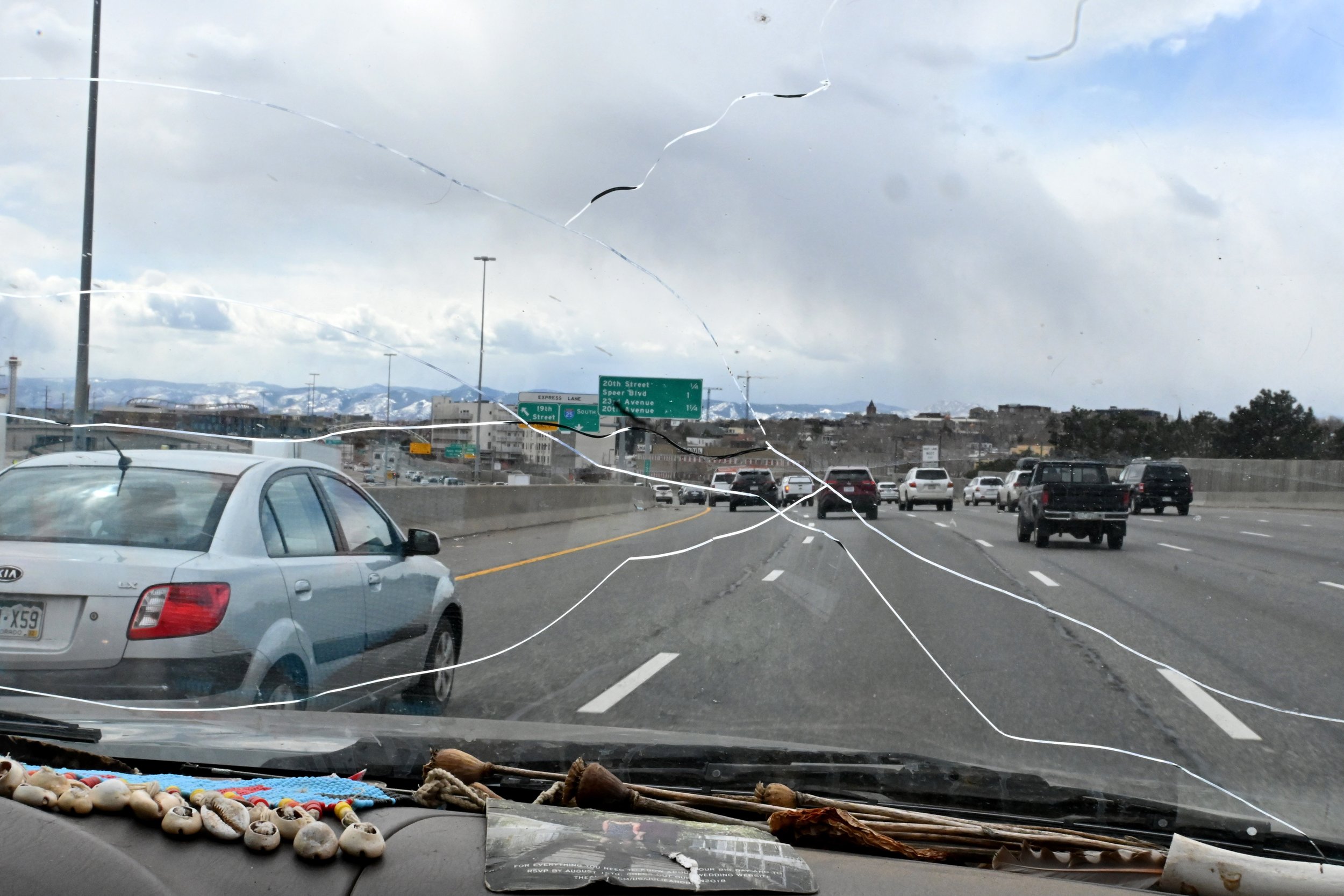
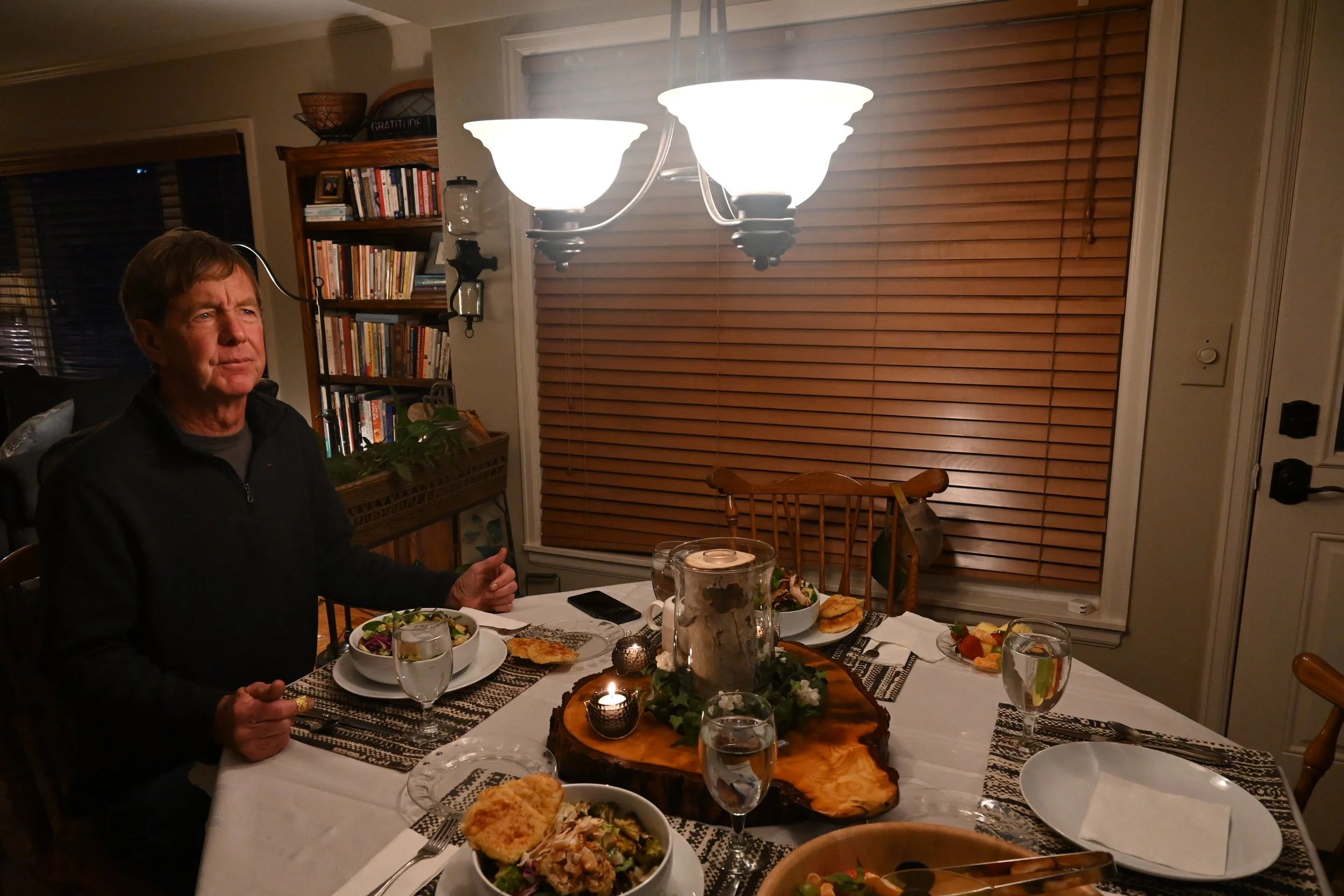

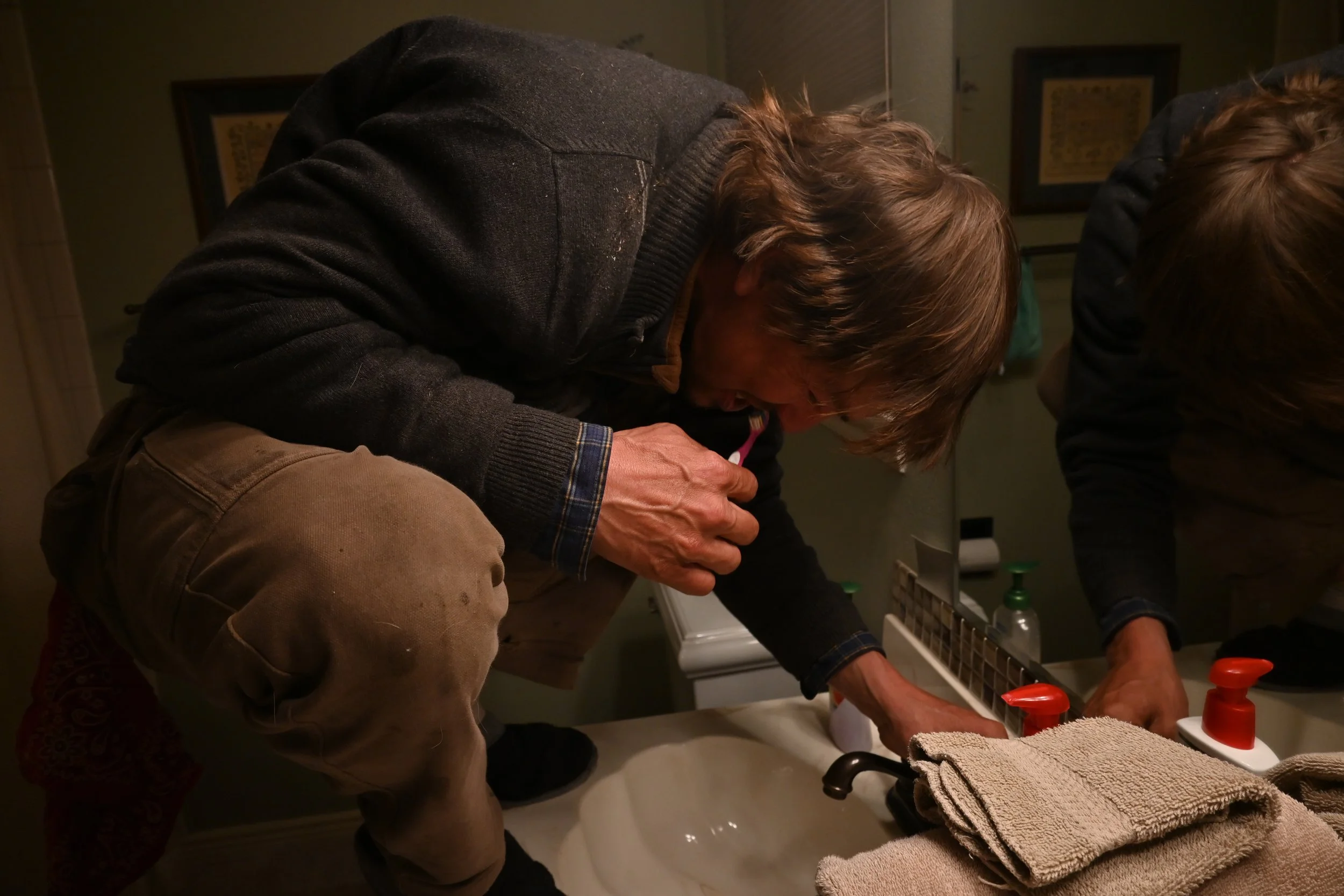

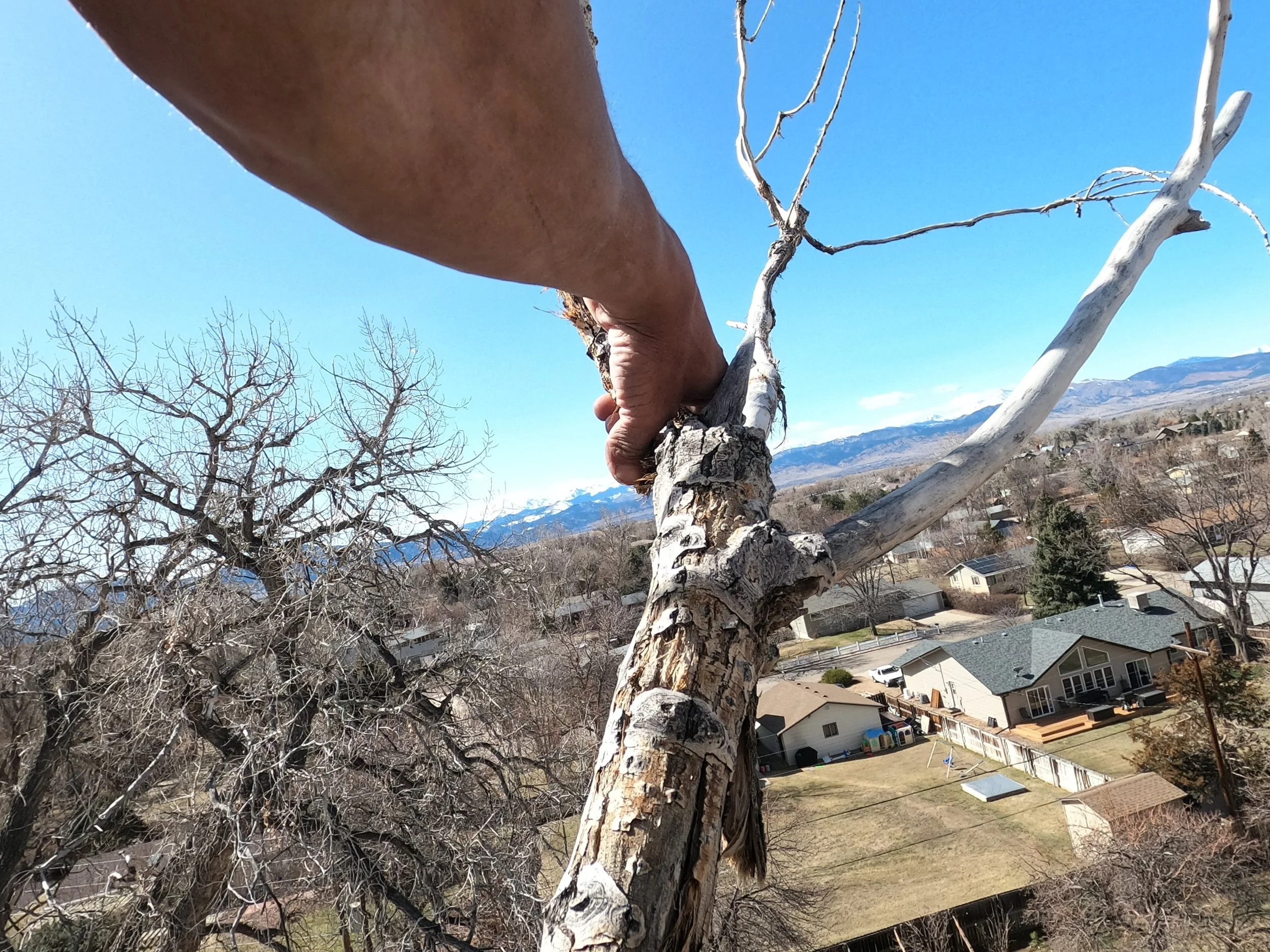
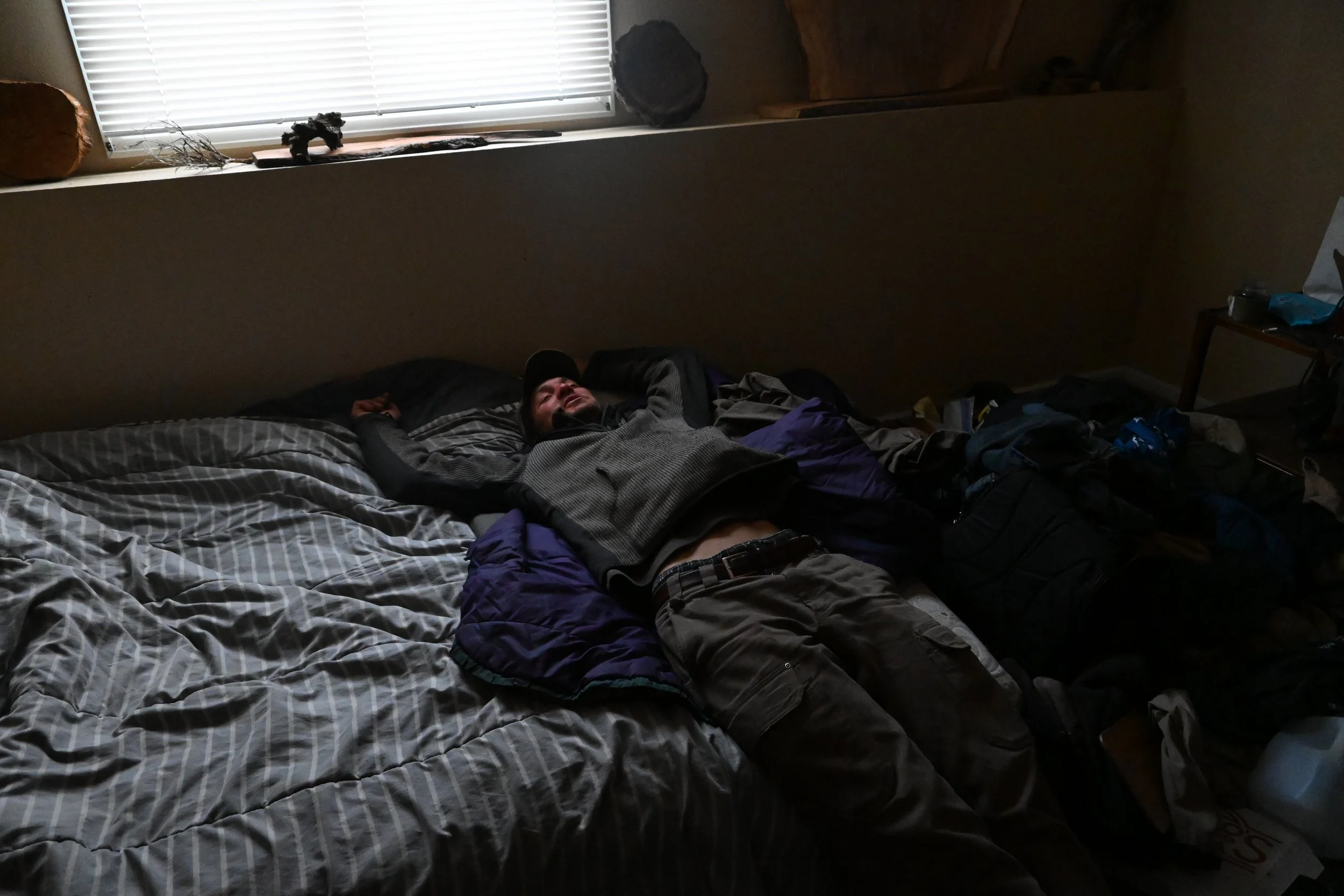

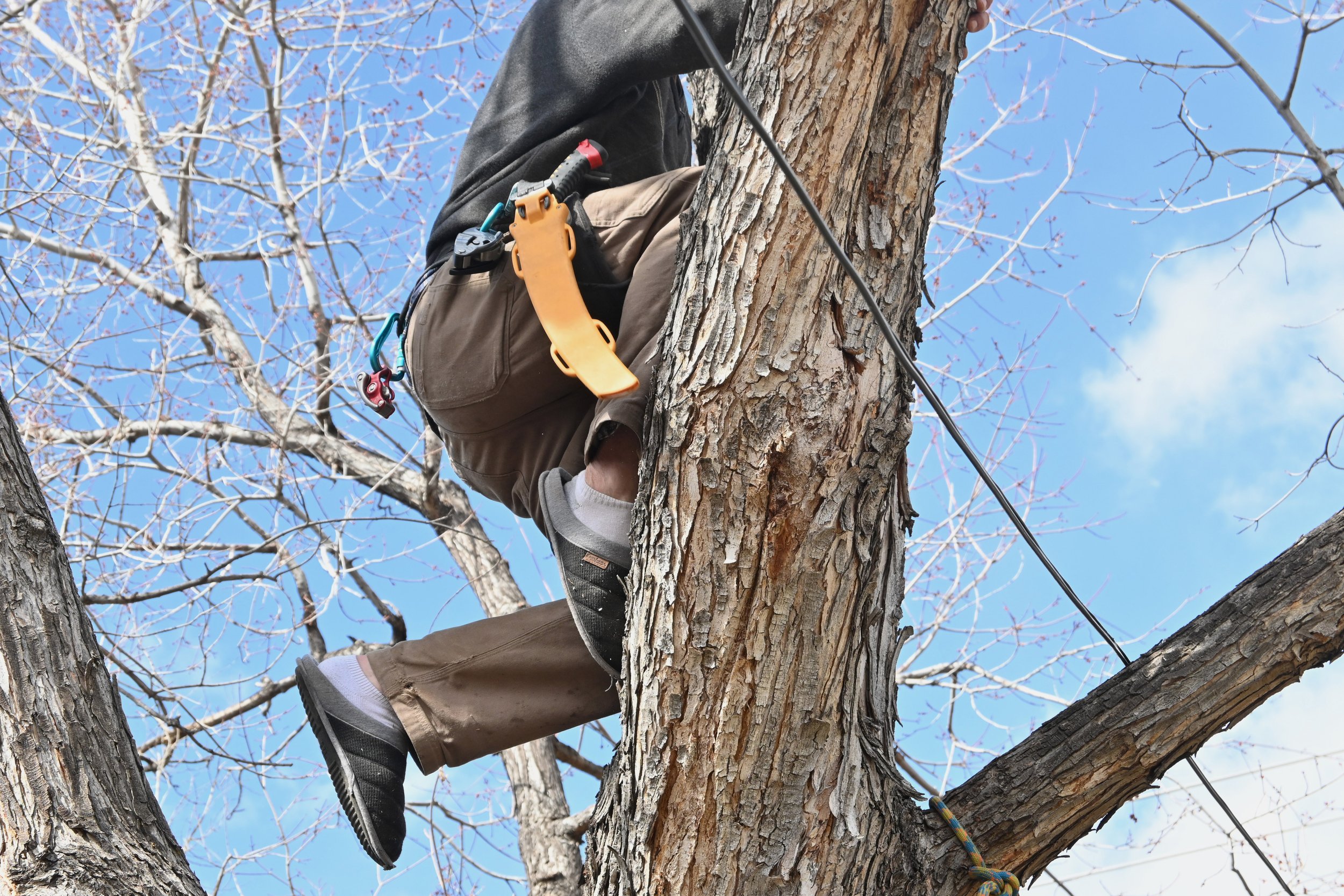

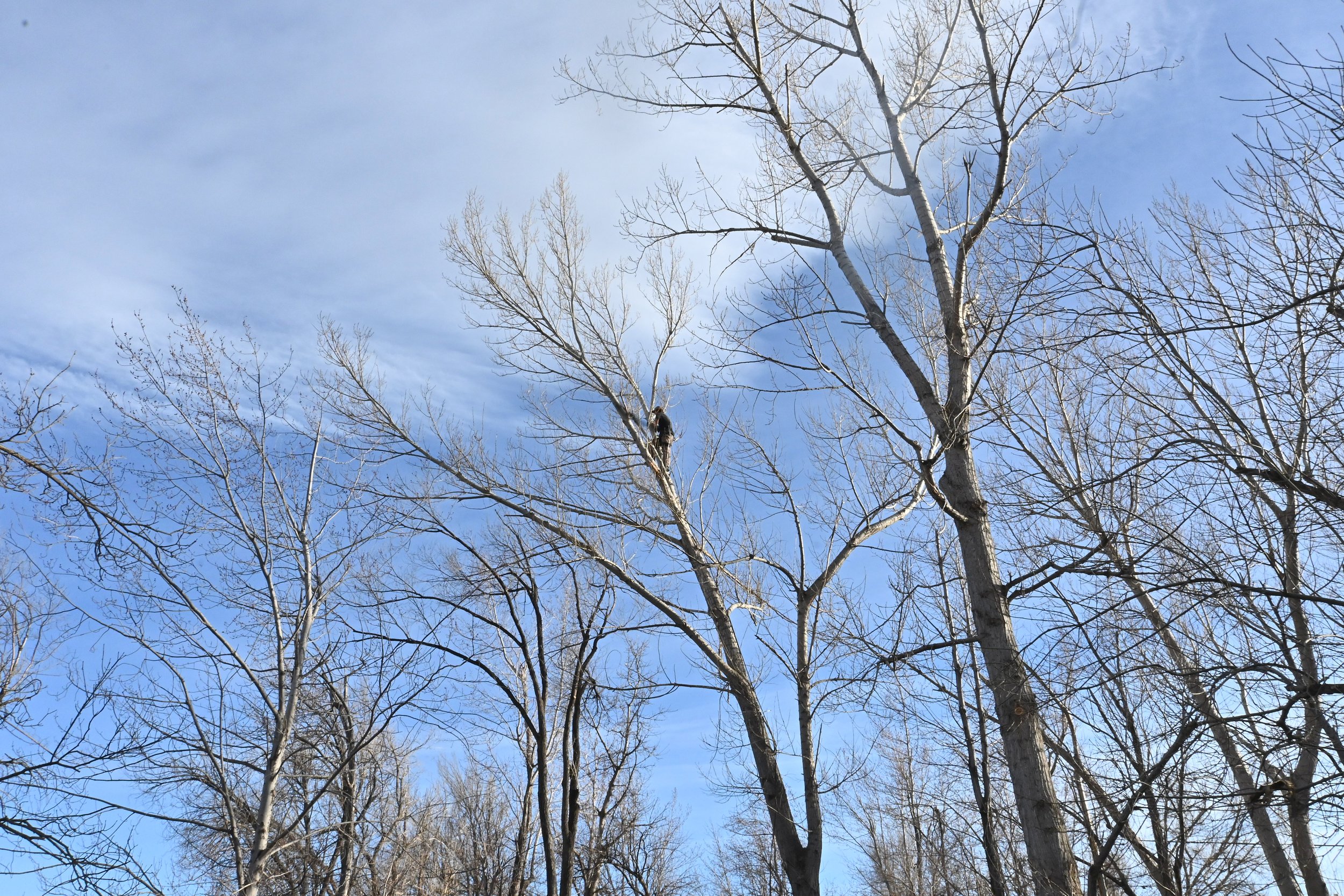

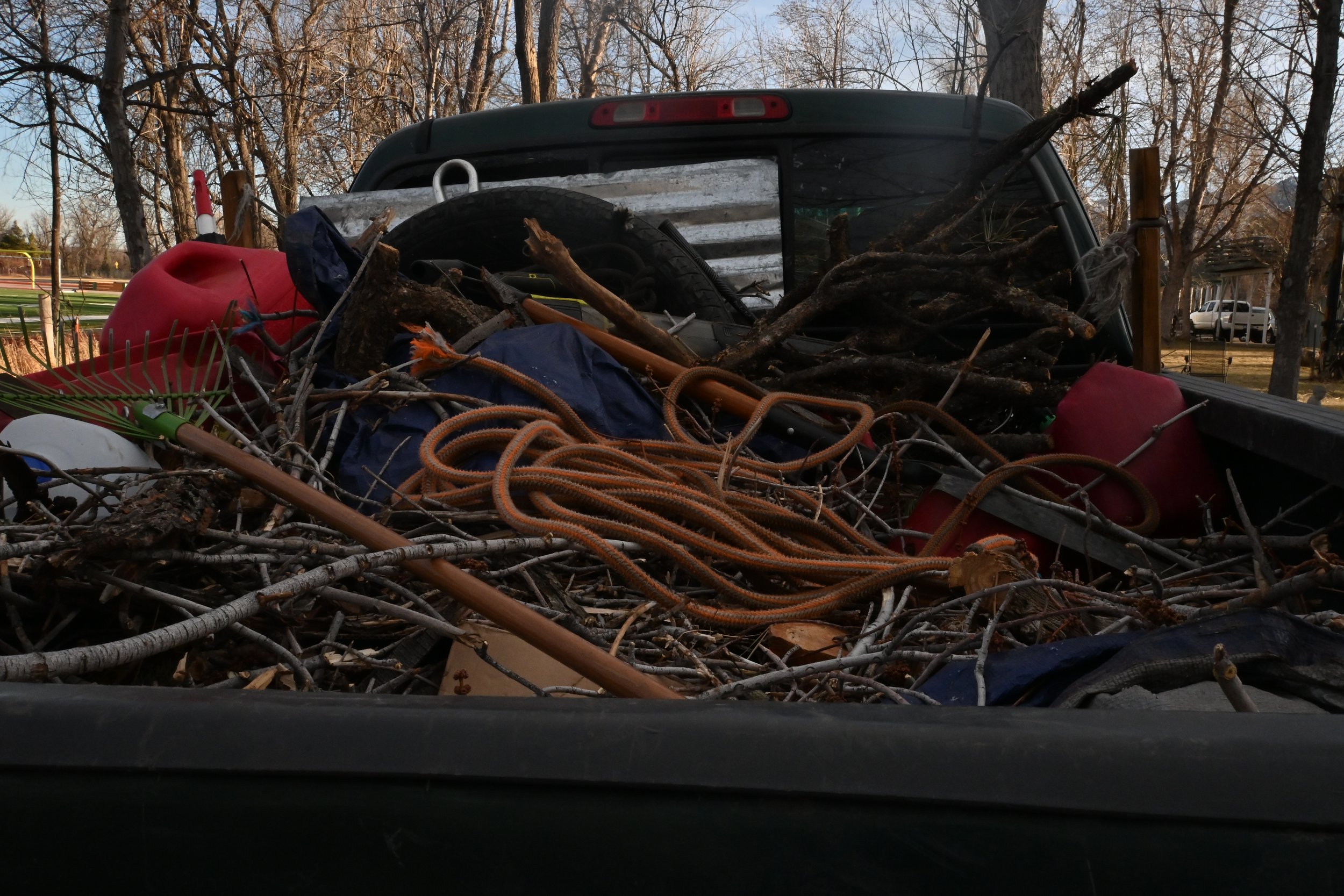

Loveland, Colorado’s Group Wedding on Valentine’s Day in 2022

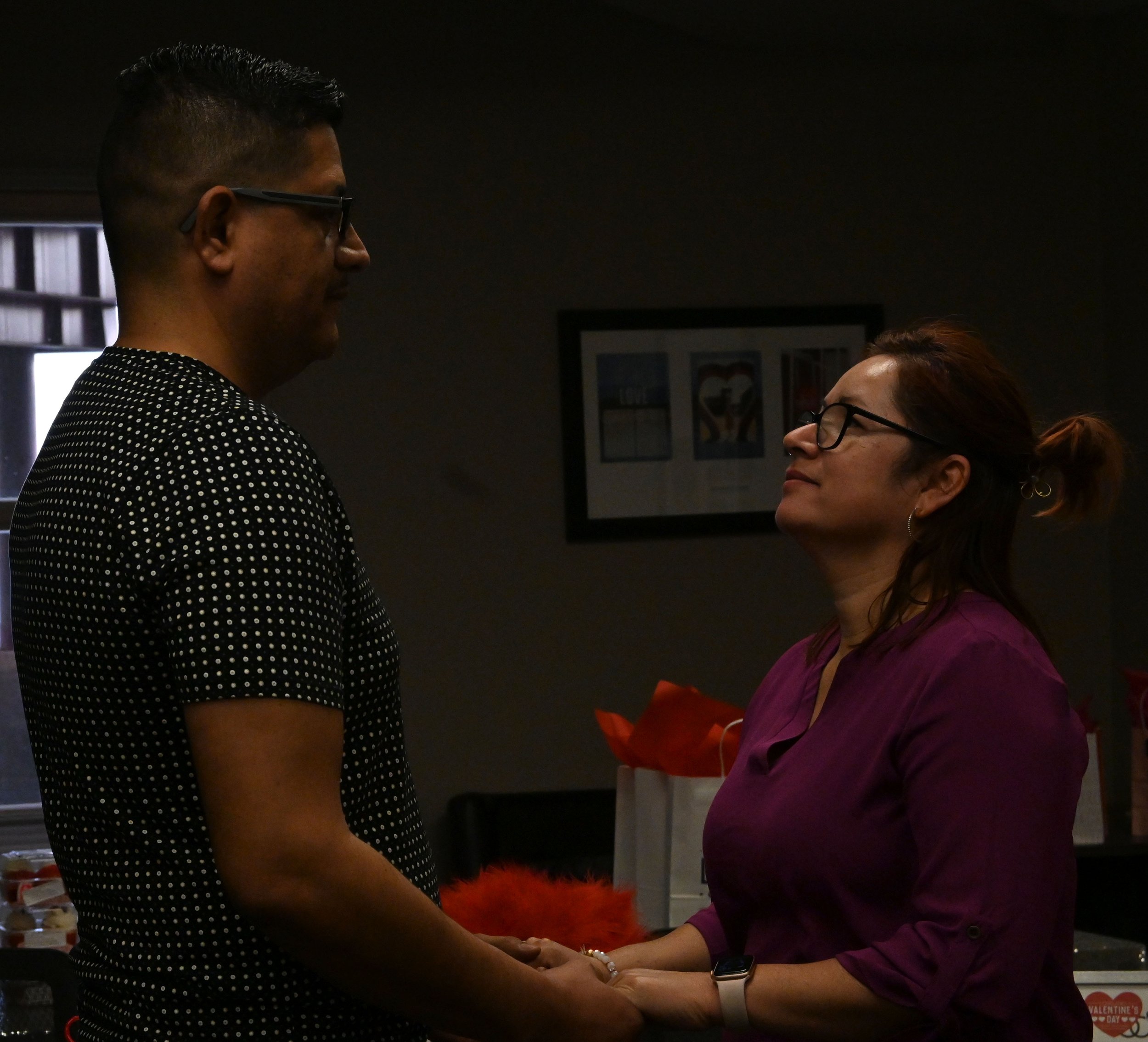













University of Colorado Boulder Buffs Women’s Basketball Team 2022






Dolly ROLL at Tracks in Denver on Feb. 18, 2022


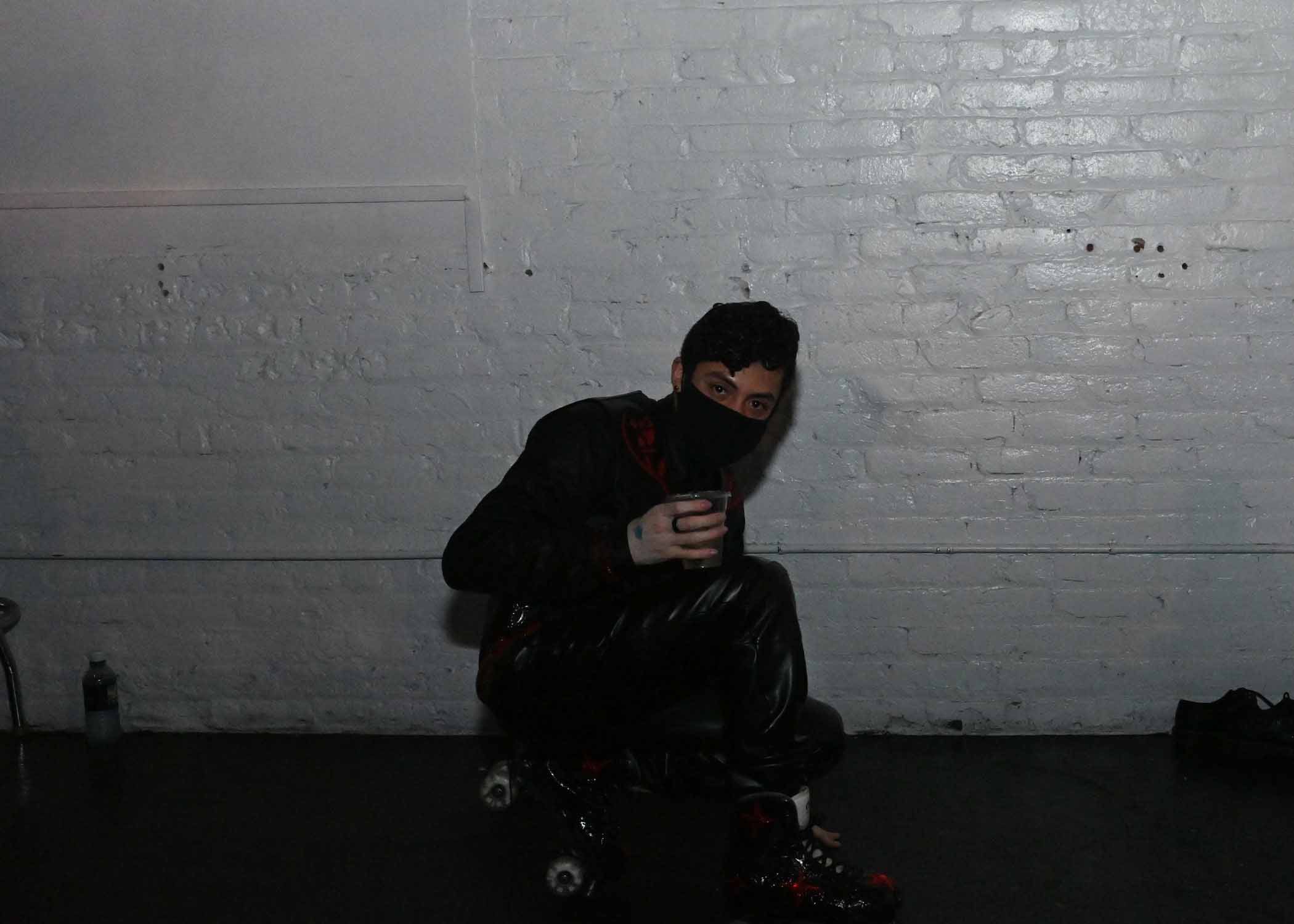
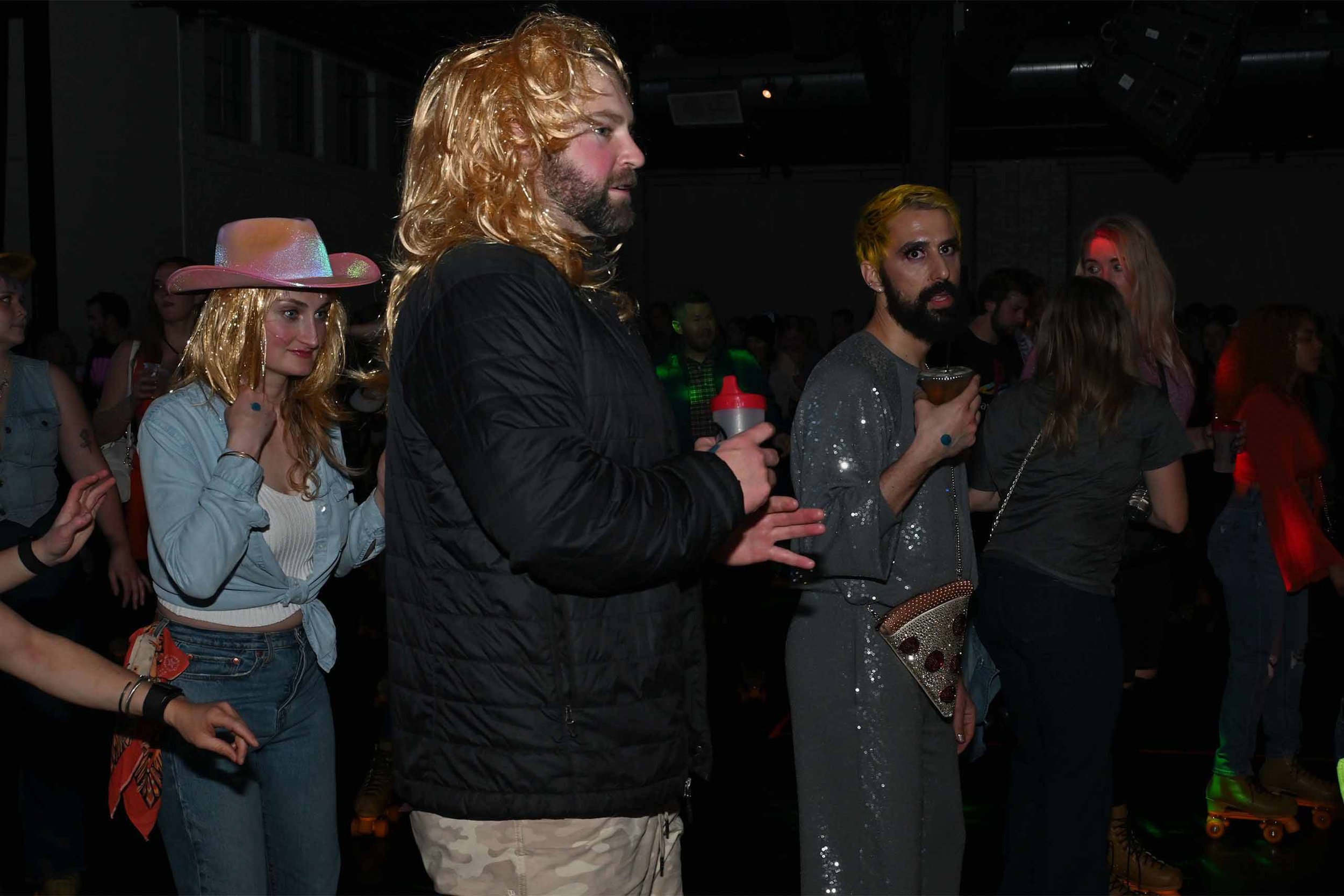
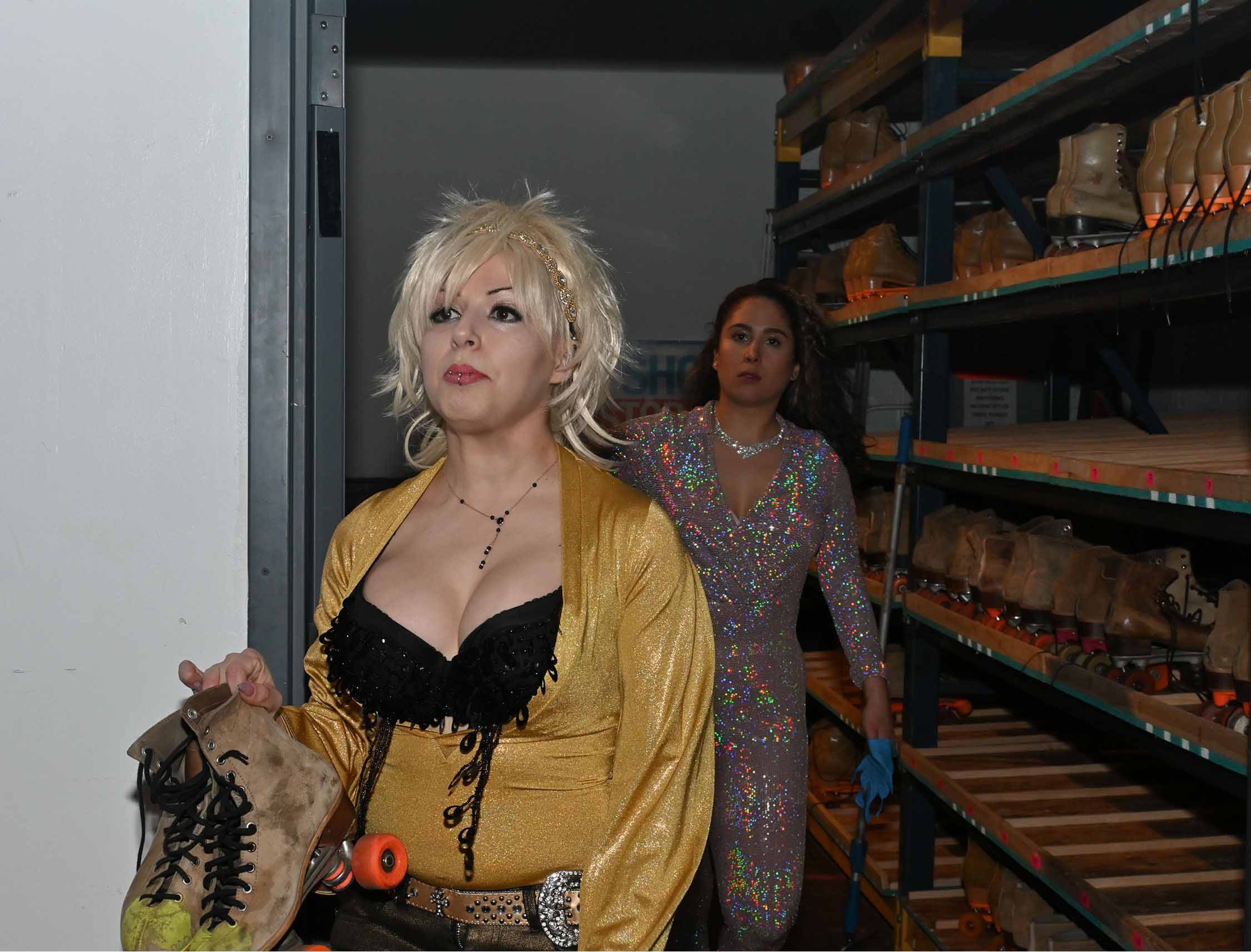
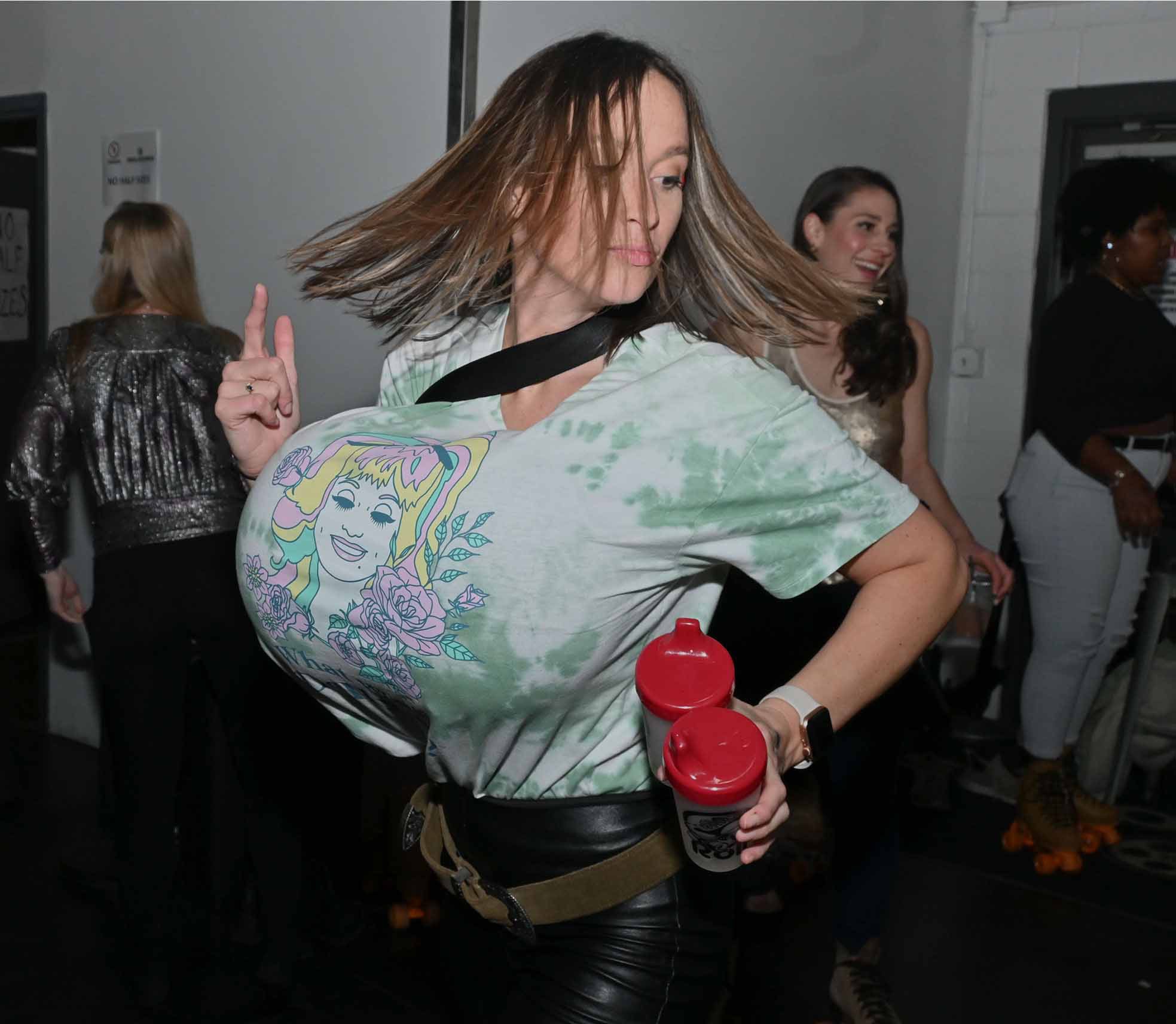

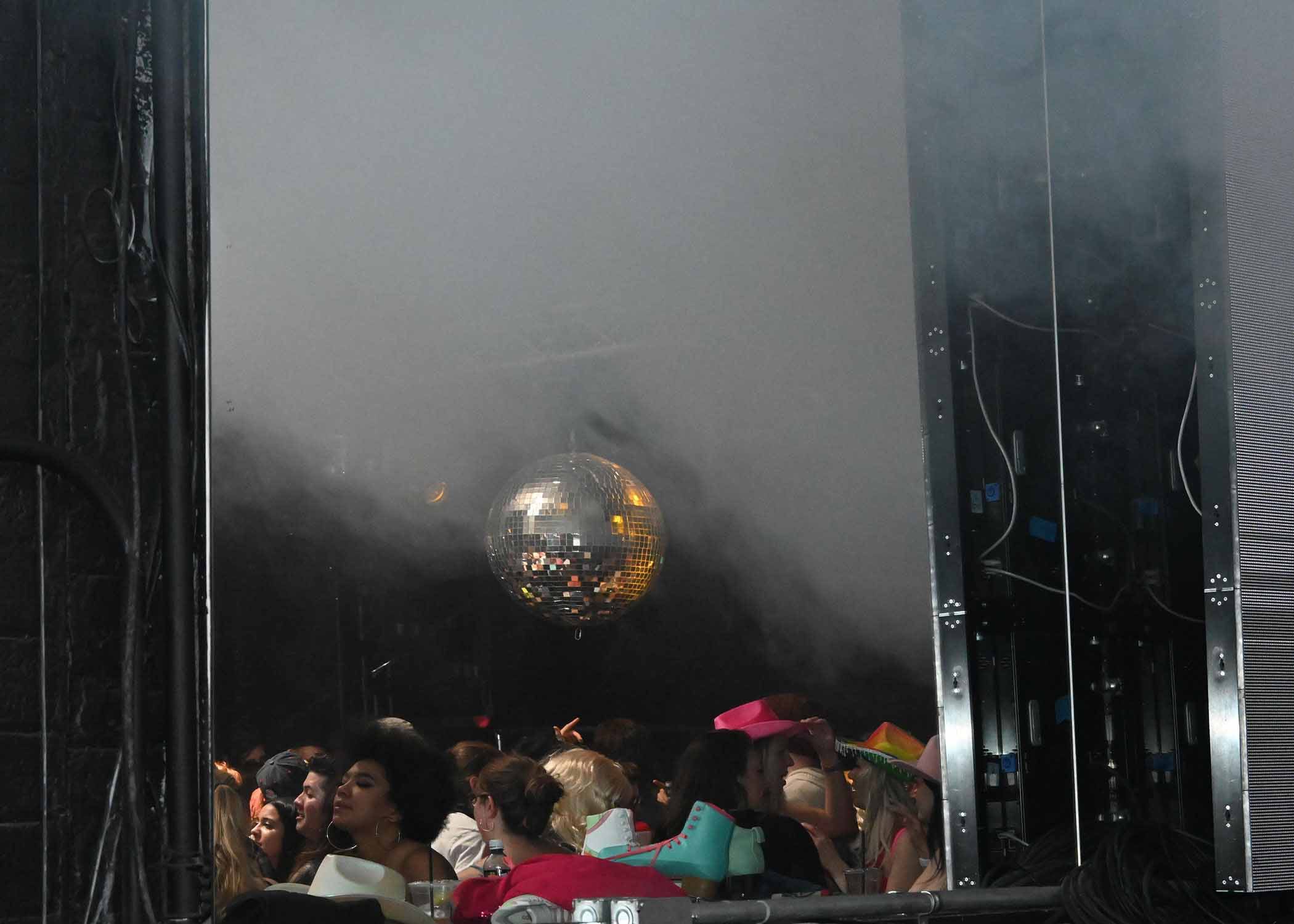
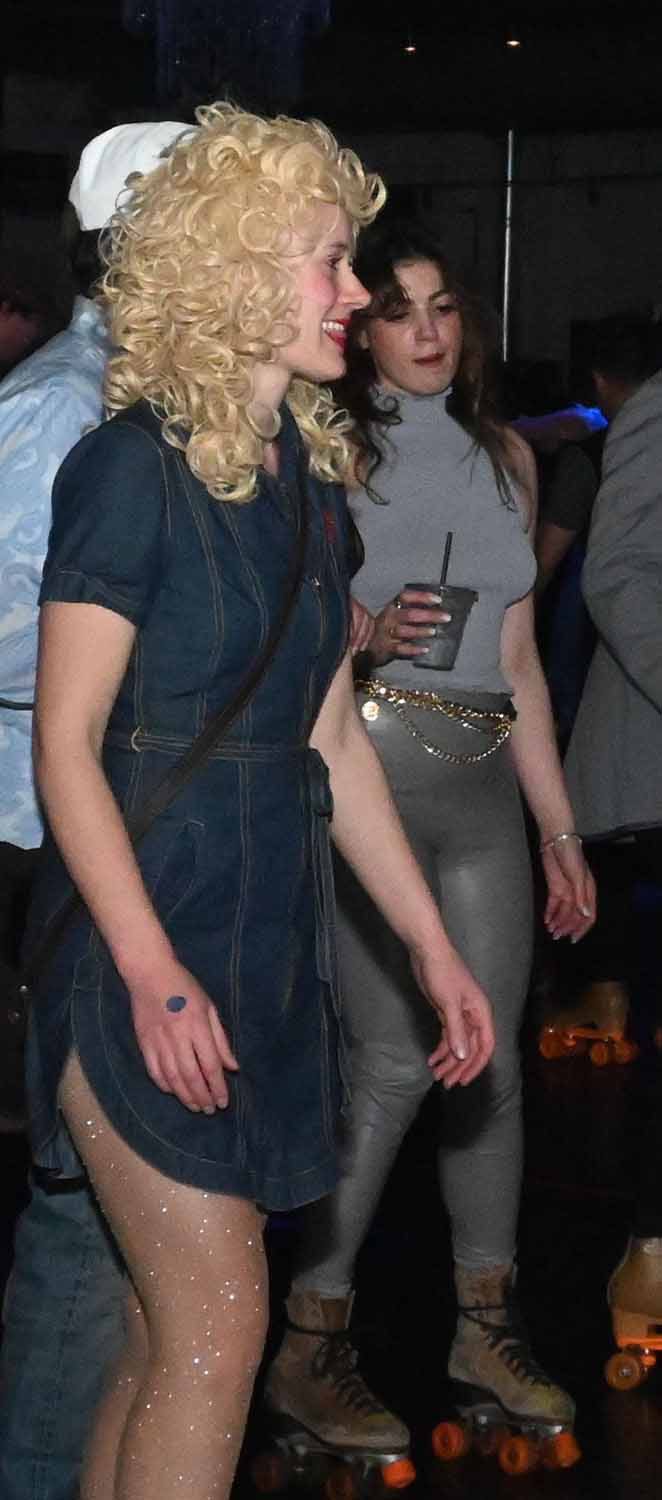

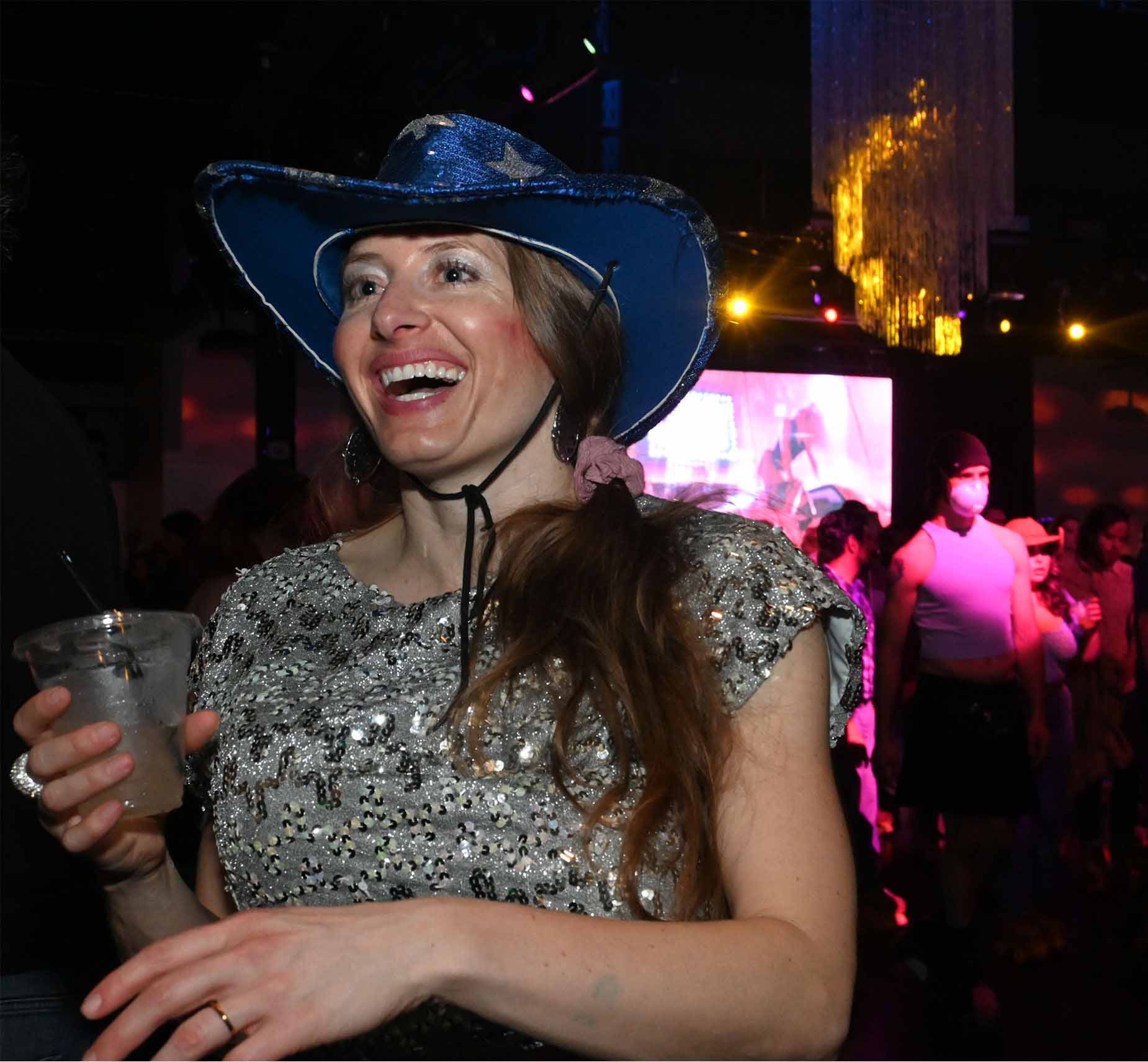
Essays
-
For months, Joey Landis was just the dog-walker, the cute guy who passed my house in Detroit most days. My housemates called him the “underwear model.” We knew each other vaguely, until he and a friend visited me in Grand Tetons National Park back in 2010. There, a love spell fell over me.
What I didn’t know was how drastically my life would change being with him. Eventually his path would take him into the strange world of neo-shamanism – a new religious movement often popularized with Indigenous ceremonial psychedelics – end our relationship and in some ways change me too. The impact on loved ones is troubling, and I went through it.
Relationships take work, especially when partnered with a stubborn, grumpy 28-year-old man. During the five years we spent together as a couple, I loved him madly – with all his moods – and sometimes it hurt. I always tried, maybe more than he deserved, to cheer him up by telling jokes and planning crazy bicycle adventures to escape our mundane Detroit lives.
We worked two blocks from each other on Cass Avenue. I bartended at an eclectic veterans’ bar, filled with regulars, artists, junkies and financially comfortable tourists from the suburbs who claimed Detroit’s rough living as their own. Two blocks down Cass Ave., Joey served bicyclists, with different backgrounds, at the community bicycle shop. He dealt with many aggressive guys on drugs and alcohol and the homeless.
Halfway in our relationship, our bond and commitment grew stronger when our parents passed away within six months of each other.
The year after our parents died, we spent 10 weeks bicycling through Central America and Mexico, on the Pan-American Highway. We slept on a beach in Ometepe, an island in Lake Nicaragua, where we saw wild horses drinking from the lake each morning. In Honduras, we met a cartographer whose daughter was Miss Honduras. He and his wife made us horchata and told us colorful stories about their lives. We slept in a Guatemalan cornfield near an archaeological site. Lonely Planet’s guidebook labeled the site as a dangerous location, where assaults on tourists happened. That night, my worries diminished as I fell asleep to a woman who sang a song, where her heart exposed its sadness from a distance. We spent a week in San Cristobal de las Casas, nestled in southern Mexico’s tall mountain range. Another week we stayed in Mexico City. There, we visited Frida Kahlo’s Casa Azul and stayed with a musician who shared his pot, and a journalist whose girlfriend lured him away from us with her sensuality.
Meanwhile, back home, friends experimented with another natural drug named ayahuasca. They called it medicine and consumed it during ayahuasca ceremonies that a guy named Tony led. Originally from the blue-collar city, Warren, Michigan, this white man moved to New Mexico and adopted a Mexican accent. I don’t know how our friends met him, but somehow, he charmed them with his charisma. Little did I know he would soon be my competitor between love and power.
“Tony always explained to people, ‘I'm not a shaman, I'm not a guru,’” said Joey. "I mean kind of saying that you're actually kind of saying, 'I am to those things.' If you were saying that out of the blue, that would imply that someone thought you were already."
***********************************************************************************
“A practitioner in Rome who told me during an interview, that shaman is like beautiful, it's not something you can tell yourself, and if you do it's really awkward," said Dr. Angela Puca, an Italian professor who teaches transcultural and neo-shamanism at Leeds Trinity University in the United Kingdom.
Over the past decade, ayahuasca gained popularity on a global level. Figures are hard to come by, but popular publications, such as The New Yorker, have made it more aware.
“It has grown exponentially in the last 10 years. There's some different things driving that. There's the increase in the spiritual but not religious population in the U.S., or the unchurched or the 'nones' who check none of the above. No religious affiliation,” said Sarah Pike, a professor of comparative religion at California State University-Chico. “Then the other reason I think is because of Michael Pollan's book and other literature, that's really making it more acceptable to use mind-altering substance or entheogens or whatever you want to call them.”
Native to the Amazonian basin, Indigenous tribes from that region use it during cultural, spiritual and medicinal ceremonies to heal. Ultimately, the brew releases DMT- the mind-altering psychoactive component that offer hallucinogenic experiences.
Neo-shamanic healing rituals involve other substances too. They also may include traditional ceremonies that involve peyote, sweat lodges and vision.
*********************************************************************************
A few months after Joey and I returned from our epic bicycle trip, we ordered breakfast at the local Coney Island- a 24-hour diner known for its chili dogs. While we waited, he informed me he wanted to go to an ayahuasca ceremony that our friends invited him to. He insisted I could not join him after I told him I would go too. He tried to explain that he wanted to ensure I would be safe if I participated, so he had to go without me first. I refused to listen and argued over my own autonomy.
He said, "(To you) instead it seemed like I just didn't want you there. And really, it felt like I was responsible for you. I was responsible for you. I wouldn't want anything bad to happen to you."
I felt devasted and rejected. I left the diner without seeing the food.
A few months after I walked out the diner, he traveled north to his first ayahuasca weekend retreat with some friends. I did not expect that he would return changed.
The night he returned, I waited with anxiety. Our housemate, Ryan, arrived home earlier, and throughout the weekend he called his wife, Lauren, multiple times to express his love for her. I never received a phone call from Joey that weekend. I didn’t know what to think.
He arrived home late at night. I had tears in my eyes, because I thought we would break up that night. Instead, he acted “blissed out,” and told me how he needed to protect and provide in our relationship, as a man. I didn’t know this Joey, and I refused to listen to this.
The prior Joey never expressed gender roles, and although he loved me, he struggled with showing his affection. I worked hard during our relationship to not take his distanced affection personally. I got used to it, so to say.
Now he wants to step-up to this relationship, I thought.
I felt uncomfortable and freaked out. Of course I wanted him to step-up to the relationship, but his personality changed, and it felt misaligned to how we used to interact. An extreme serious side replaced his humor, and for me, I needed that humor to “laugh things off.”
As the months went by, he participated in more ayahuasca and peyote ceremonies with his “circle”- his group that shaman Tony indoctrinated.
I felt even more confused. It seemed like Joey joined a cult-like group because his personality changed drastically, and he became obsessed with hanging out in the “circle.” It seemed everybody changed. Ryan requested a divorce from his wife. Our community became divided between “Tony followers” and their loved ones.
Nothing felt right. I talked with Joey multiple times on how I disapproved this method to “better himself.” Even though I stood up to him, I felt so alone and rejected. I felt he abandoned the guy I loved for this ultra-spiritual and energetically enlightened man I didn’t know and didn’t love. This was extreme.
As Joey’s optimistic attitude exponentially ascended, I resented him, the part of my community that joined the “circle” and Tony. I didn’t understand why everyone changed suddenly and participated in a variety of Indigenous healing ceremonies.
I felt that his spirituality soared above me, and I would never climb to that level. We played a game of tug-of-war. I judged him while he accepted everyone with love.
The truth is, since I never participated in their ayahuasca retreats, I literally would never reach Joey’s level, because I did not alter my mind with the psychedelic substance.
Ayahuasca needs to be spread around the world so we can all heal and be at peace, Joey used to say constantly.
Isn’t this good, I questioned myself. Why don’t I want to support these guys spreading “world peace?”
I wanted (and waited for) the funny, sometimes bitter Joey to return. I wanted to hug that guy again.
One afternoon, I talked with our friend Kevin at home about Joey.
Joey’s just not funny anymore, Kevin said. He changed.
That was the first time I felt validated. It meant a lot to hear it from Kevin because they were good friends, and he never gossiped. Except this time.
What can we do to get him back, I asked?
Nothing. We just have to wait, he said.
**********************************************************************************
A word exists that describes Joey’s personality change: radical departure. Sarah Pike said this is common when people join new religious movements that involve hallucinogenic spiritual ceremonies. This happens when young people in their teens and 20s transition into adulthood. Joey was 28 at the time.
**********************************************************************************
In our final year together, I tried to support him multiple times. I attended the “circle’s” “Song Club” once. Joey and I shared excitement to learn how to play songs with our talented musician friends. The Sunday I went, I expected us to learn how to play songs from artists we liked, such as the Velvet Underground and Neil Young.
Instead, what we played consisted of traditional, spiritually themed, Lakota and Jewish devotional songs. None of us were Lakota. To me, it felt like cultural appropriation and I never went again.
While Sarah Pike and I talked about whether new religious movements culturally appropriated, she said, “Particularly now, in the particular climate we're in, where Indigenous people are really struggling for their own rights of self-determination, it's really problematic to take those traditions, put them in a different context, charge a lot of money for them. So yes, I think that it often is cultural appropriation.”
Dr. William Barnard, who teaches mysticism, religion and contemporary spirituality at Southern Methodist University in Dallas, thinks that cultural appropriation is a complex issue because some Indigenous groups invite outsiders to participate in their traditions.
He said in an email, “There are, of course, situations in which white people intrude upon/distort/profit from ceremonial traditions that aren’t their own. But even then, it’s still complicated.”
***********************************************************************************
Five of us bought a school bus together and drove it to their vision quest near Portal, Arizona. The bus ride was fun because we joked around a bunch, until we arrived at Tony’s house in Albuquerque. That night, pre-vision quest, we participated in a spiritual cleanse in Tony’s sweat lodge. It was my first time in a sweat lodge, and what happened inside felt visceral. Tony consistently beat a drum, chanted and sang supposed Lakota songs. The drum beat vibrated through my body.
The fire in the center crackled while someone turned the hot coals over. Sweat poured off my body. The dirt floor we sat down on turned muddy which cooled me down. The aroma of cedar filled the hut as Tony repeatedly threw cedar in the fire to purify us.
The following day, we arrived at a remote, desert land near Portal, where we set up camp and built a sweat lodge from the sticks and layers of canvas material Tony brought from his house.
Again, we purified ourselves in the sweat lodge before the questers ventured off on their three day and three-night vision quest the next day. They would spend that time alone, away from one another, without food, water and shelter. They could bring a blanket and wear the white clothing they had on while they sought out their inner truths. Tony, as their shaman, checked in on them once. When Tony returned, he joked about Joey being a homemaker, because he constructed a path lined with rocks that led to his little circle somewhere on the mountain nearby.
While I waited in the desert for Joey and the others to finish up their three-day vision quest, Tony sat in a chair while us women had to prepare and cook the meals. He could not help, as his job was to wait for messages from spirits to tell him if the questers needed help. To me, I felt he used his power to enforce gender roles.
The ultimate was when I got my period there. Because of this, I wasn’t invited in the “sacred circle” that protected the sacred bonfire, because my “moon cycle” (as Tony called it) took energy away from everyone else. Joey believed this and left me alone when he returned from his vision quest.
************************************************************************************
We broke up a year after he drastically changed. Within that year, we studied herbal medicine together in North Carolina. There, we increasingly grew frustrated with each other. And we both fantasized about being with new people in our lives. The fantasy didn’t last once we tried it, but we remained broken up.
Three years after our break-up, I drove to Phoenix from where I lived in Page, Arizona to see our friend Bobby’s band play.
After they played, we sat and talked about life over beers in the darkened venue while other bands played in the background.
So, how’s everyone back home, I asked him. How’s “the circle?” Years ago, I saw Bobby at this peyote retreat I attended with Joey. So I thought Bobby followed Tony as well.
He said, “I never went back after what happened on New Year’s Eve this year.”
I felt intrigued and asked, “What happened?”
He said, “You didn’t hear?”
“No. I don’t really talk to that crowd anymore. Everyone is so secretive,” I said.
What happened during the New Year’s Eve of 2017 ayahuasca retreat was that Tony abused his power over the group after everyone ingested the plant medicine.
He told everyone how they would never amount to anything, because they’ve done nothing with their lives. He said “look at me. I can get any woman I want, and I’m married with kids,” Bobby said.
I asked, “What did Joey do?” Because in my mind I thought Joey would stand up for himself and his friends.
Joey did nothing, said Bobby. He needs someone to follow, and Tony happens to be that guy.
*********************************************************************************
Joey followed Tony for four years. He did three other vision quests and traveled to Peru for a weeklong ayahuasca retreat. He tried other healing practices and became a yoga teacher. Eventually, he dropped it all and worked as a carpenter and rock climbed as a hobby.
The last time we talked about his ayahuasca experience, I asked him why he wanted to do it so bad.
He said, "I don't think I wanted to do it so bad. That's kind of the irony to it. I wasn't searching for healing. I wasn't even searching for spirituality.”
He seemed unclear about his feelings on that chapter of his life.
I don’t understand why this happened to him. But I do know it affected my trajectory in life. I never loved anyone the same way I loved Joey Landis.
Recently, I thought back on the day I walked out of the Coney Island diner. He may have been right. He may have protected me from Tony’s abuse. I believe my intuition was right to not trust the guy. It sure in hell wasn’t easy though, to let go of someone I loved enormously and reroute my own path alone.
-
Whipping around on a wooden floor and feeling the indoor breeze blow through my hair has brought some of the best feelings in my life. Back in the day, as I smoothly glided to Billy Joel’s We Didn’t Start the Fire, followed up with The Gap Band’s You Dropped a Bomb on Me, my eight-year-old self never felt so free. Doubled up on layered socks, sometimes even tripled, with the cute fold over so each color could be seen; I always tried to make a chunk of my front hair stand as far up from my forehead as it could, only to have it draped down to the side- I looked good in those skates. With the music bumped up, neon lights illuminated and a disco ball glimmered in the middle, I skated around the rink until the sessions ended. From childhood into the present moment, I belonged in this scene.
The roller rink was my emotional safe zone. It gave me freedom away from the trailer park I grew up in, freedom from immature adults who tried to support my growth and protect me but were not able to when their vices kicked in-which happened often. We did not always go to the rink, but when my single mother could scrap some petty cash, those were some of my best days growing up. Friends rarely joined, since she couldn’t pay their way, so it usually was just my brother and me and I always skated in solitude. I never felt lonely though. I always felt free. And when it was time to go home, I would look out the window from our car’s backseat, quietly daydreaming alternative realities I wished I would have one day. On the rare occasions I went to the rink with a friend, we excitedly laced up our skates and looked around at cute boys we could temporarily crush on, because even as a kid I longed to be admired-even though I never felt like I fit in at school. I was socially awkward and insecure- but the rink is where that all slipped away from me. I didn’t have to try to be someone I wasn’t, I only had to zip through on eight wheels, and I felt whole.
I was good skating on this dance floor. I felt lucky to have my own skates, with white “boots” and red wheels, and before I had those I possessed an adjustable red strapped kind with metal hardware where I slipped my whole shoe in. I could skate many ways- backwards, forwards, one leg up. If I fell, it did not matter, we all fall sometimes, and it is ok.
My mom fell often- from early youth to her death, she was attracted to a fast life with temporary fixes. She struggled to support my brother and me, let alone herself. She couldn’t promise us safety, and her temper terrified me. When she succumbed to her weaknesses-uppers, alcohol and men- it took days for her to recover; to try to be a mother again. But on the good days, her heart immensely loved us. And she shined through with her graceful movements, her musical voice and her humor. She skated on ice like a professional figure skater, performing jumps I never could accomplish. She used to be a synchronized swimmer and she could walk on her two hands. Who she was on her good days is who I wished to be- expressive. She taught me how to dance with rhythm and we spent unforgettable times holding hands and dancing energetically in our tiny living room that somehow worked for us. She showed me love when she could. Her last fall was her last high, shortly after being freed from a nine month incarceration stint. Her heart beat longer than I anticipated it would, and at 57-years old, it finally stopped.
As a kid, I fell more than once too, but I always picked myself back up and avoided making the same mistakes. Rolling around indoors at the rink, one kid fall and about four others stumbled over each other. I, as well, became part of that pile-on. I felt exhilarated to have survived this rollerskating crash with only a couple scrapes. And for a brief moment, these kids felt like friends too.
Glen lived on a different street in the trailer park I grew up in. He and my mom partied together for a while. I approved of him because he taught figure roller skating back then. I never knew there was such a thing until I met him. I desperately wanted to take his class, but we couldn’t afford it and he never offered his expertise pro bono to me. Instead, what I got from him was the ability to look at his aquarium collection that filled his space. So many vibrant colors splashed in his otherwise brown living room, where he bragged about his classes, flaunting off his young, privileged students by pressing play on the VCR. It pumped his ego while he probably crushed on my mom. The tapes didn’t constantly play though. His brown couch, surrounded by brown paneled walls with shadows that darkened the room even further, offered me boredom while the fish swam trapped in their tanks. What Glen did give me was inspiration that I eventually lost as I grew in my teenage years.
***
However, it came back. I do not remember the defining moment, but the feeling instantly returned when I hit the rink floor. Maybe it happened when my classmate invited me to go skating. Maybe when I roller skated a couple times with my co-workers from the vegetarian restaurant I worked at. My eyes followed my coworker’s close-to-shoulder-length hair as it flowed beautifully from him as he smoothly skated. Maybe it was when my previous housemates and I skated a couple times. Either way, I was hooked and spent my 32nd birthday on the rink. The kinetic breeze returned to my life again and I could not stop. Skating liberated me from societal expectations- from the stress of working multiple jobs (bartending; massage therapy; urban gardening) and being in a relationship where it was clear I fought too hard to make it work. Skating released me from adult stresses again, but this time the stresses resulted from my responsibilities I took on and I had control over most of my choices- and this was the time I reacquainted myself with roller skating. It reminded me that I’m more than the expectations I put on myself, and I can temporarily skate free from them whenever I’m at the rink.
Now, I take in the environment at great depth, and the surroundings envelope me completely. The music, although different than what it used to be, vibrates through my body again, and the fluorescent lights and disco ball never left.
Around 2014, it occurred to me that roller-skating carries its own culture, filled with a diverse range of people- especially with Black culture where it holds significant historical context dating back from the Civil Rights movement to rinks used as hip-hop venues when other venues played into racism- who made skating their religion- or at least part of it. I skated in awe as I witnessed them dance stepping on their wheels. I skated, wonderstruck, as I watched couples holding each other close while they showed off their perfect synchronized moves on the wooden floor-their love language. I finally made it to adult night, and it gets me every time.
My relationship with roller skating has weaved through my growth as a person. I now can take myself to the rink, instead of waiting for my mom to scrape up change. I bought my current skates twenty years ago- Blue suede Pumas with a yellow wave running down each side of the skate- and I can buy nachos and cheese if I desire those too- which I often crave. I can go with friends and not daydream about alternate realities while looking out the backseat window heading home.
I still fall at times, especially when people talk to me while I skate around the rink, like when my past classmate Bentley asked me, “Can you skate backwards?”
Instead of me trying, I turned my head over to look at him and I just fell. He responded, “Nevermind,” and skated on as I restabilized myself on eight wheels.
I recognize the free feeling I get while skating has followed me in my life, where I’ve revisited the space that always served me a sense of just being, not trying hard to prove myself to anyone. I’m liberated on eight wheels, where I have witnessed myself grow into who I am- and yet I’m subtly connected to who I once was so many years ago.
***
-
When 21-year-old Cal State football star Ron Settles died in the custody of the Signal Hill Police Department in 1981, it lit a fire for his aunt Madelyn Strong Woodley.
The death of her nephew became a catalyst for Woodley’s social justice work, which she has focused on Boulder County since she moved to Longmont from Memphis in 2000. In the years since, the 70-year-old retired Security Executive Manager for FedEx has focused on making her Colorado home [a more equitable and affirming place].
Woodley was among the first members of Boulder County’s first Police Oversight Task Force and Implementation Team, which formed two months after footage of an altercation between armed Boulder PD officers and Naropa University student Zayd Atkinson went viral in March 2019. She served on the task force for the following two years, before taking on an advisory role.
Following the first Police Oversight Task Force and Implementation Team, Boulder County’s NAACP has collaborated with the county’s Reimagining Policing team, where they formed the Black and African American Leadership Team. This subgroup is one of ten groups that represent the Community Advisory Group for Reimagining Policing in the local region.
Currently, she is the president of the Executive Committee, African American Cultural Events (ECAACE), an organization that highlights African American culture and accomplishments in Boulder County. Recently, the organization helped organize Juneteenth, where they featured a documentary they produce: Stories from not long ago - Hughes Van Ellis and Ed Dwight | Tulsa Race Massacre.
“I'm told by people who really know me that I’m working harder now than I ever worked when I was being paid,” Woodley says with a laugh. “My daughter Donna teases me all the time. She says, ‘Ma, I just have to remind you, you’re retired.’”
Woodley’s response to this question is the animating force behind her decades of advocacy work: “Somebody’s gotta do it.”
This conversation has been edited for brevity and clarity.
____
What drives you to be an advocate for the social justice movement?
The people who are in need, and there are many.
We can talk about my nephew who was killed. He was killed by the Signal Hill police department in 1981. He was a 21 year old blooming superstar football player at Cal State University Long Beach. He got stopped supposedly for speeding. His name was Ron Settles. If you Google it, you would go ahead and pull up the Ron Settles Memorial Foundation. There should be no reason why my nephew is no longer with us. There should be no reason they stopped him on that day. When he was on his way to his little job working…at Polytechnic High School. He worked during the lunch period to make sure the kids didn’t fight. And so he was on his way there. He went through Signal Hill, and the next thing we know, they claim he committed suicide. (The police say) that he was so distraught and so afraid that his mom was going to be upset with him. Okay, you go from being afraid your mom is upset with you to now you’re hanging in your jail cell?
First of all, he’s never been to jail. He was a sought after professional - the Dallas Cowboys was among the many that were looking in recruiting him. He was a star football player in his senior year at Cal State Long Beach. And so they stopped him saying he was speeding something like 47 in a 40. Okay. They stopped him and then they claim that when they stopped him, he got out and he launched at them with a butcher knife that had a blade on it this long. When everybody heard that, everybody had the same reply. And they were like..."what?".
Ronnie was the nicest, most laid back, calm, quiet individual ever. You think he hasn't been taught better than that by his parents? By his aunts, by his uncle's? Do you think for one minute? No, no, no, no, no, no, not possible.
I'm concerned about the generations to come. I'm just trying to influence folks to join me, because I can't do it alone.
Will you recall early instances of racial justice work in Boulder County?
I'll go back to 1995 — that’s when I remember my sister (Glenda Robinson) starting celebrations; there were no kind of celebrations highlighting or celebrating the African American element of Longmont at all. And she started it at her home. She did everything from having an annual celebration where she honored the seniors within Boulder County, particularly Longmont, and those people who were first to work in their respective fields.
One example would be Mrs. Betty Everett, who is still alive and with us today. I would guess and say she's probably in her early 90s or late 80s. She was the first African American nurse at Longmont United Hospital.
Also, Mrs. Johnnie Davis, who just passed away last year, was the first African American school teacher in Longmont.
Tell me more about ECAACE.
ECAACE (Executive Committee, African American Cultural Events) was formed as a result of a call to action from the community to have events that highlighted and honored African American culture. One of the things I've said repeatedly is in Longmont, I am not invisible. I'm here, I’ve been here, I'm not going anywhere. I don't like feeling invisible or being treated like I don't exist. And with the many contributions that I make, personally, and not just me, but other people along with me that look like me but yet it's not it's not ever recognized or acknowledged. And that's not a good feeling.
Our 2021 Juneteenth Celebration was one of the most significant productions of all because it had not been voted in as a national holiday until that year. If I had one thing you asked me, to describe for you one project that I've felt was special, but also was challenging, I'd say Juneteenth. That whole project because it was unknown here. Nobody knew about Juneteenth. It was our work that changed that. As of June 19, 2021 President Biden signed it in as a recognized and celebrated National Holiday. Our inaugural celebration,virtually due to the pandemic, featured Ms. Opal Lee, aka The Grandmother of Juneteenth. That production made it well known particularly in Boulder County and ultimately all over.
What does it mean for you to reimagine policing?
The Reimagining Policing Pledge is a call for mayors and local officials to review and reform use of force policies, redefine public safety, and combat systemic racism within law enforcement.
I think everything about our current law enforcement system and its governing methods should be reexamined. Processes, systems and/or procedures that govern practically anything, need to be reviewed on a regularly scheduled basis. Example... traffic stops initiated due to expired tags could be handled by another classification of officers. There could be a different classification to handle that level of responsibility and that could accommodate those tasks. At one time in Memphis we had a whole different classification and category of police known as PSTs: police technicians, Essentially,they handled non-moving violations, expired tags etc…violations of that nature. Mainly, non-moving infractions. It was an entry level position that was mostly used to begin a career in law enforcement. I see no reason for a seasoned police officer to handle such violations i.e.,one headlight situation, expired tags etc.. Seasoned veteran police officers’ time, knowledge, experience and skills should be better utilized…
What is in most need of re-imagining, in your view?
The duties and responsibilities definitely need to be redefined. There is no reason why my nephew is no longer with us. They saw a young black man driving a new car, a new TR7 sports car. You know, the hardtop convertible. And the interior was brown, white, and black plaid. It was snazzy, it was a beautiful car. He had done well in school and all around. It was coming up on his senior year and he had also done well on the football field. Buying him that car was his parents' way of rewarding him for doing well and living his life focused and with purpose. It was just a gift they could afford and they proudly rewarded him. That’s why they stopped him on June 2, 1981, essentially he was driving while Black in a new car.
Training is also critical. It's the thing that should be very, very necessary. Otherwise you're putting other people at risk.
It's important that we look at all aspects of what goes into it, you know, from the physical, the emotional, the everything. Every little aspect of it is critical. And of course, you can not line it all up and say it's not all important., You got to prioritize it. It's important that it be prioritized otherwise, the enormity makes it appear undoable.
Why do you want to do this work (Black and African American Leadership Team and other activist work?
Because I'd like to contribute to stopping the madness.
Let's go back to Ronnie in 1981. Before Ronnie there was Geronimo Pratt. Just the number of people that have been murdered senselessly by the police from before then to most recent,the murder of George Floyd. It hurts me personally. It has not gotten any better. And it's very painful. It's hurtful. And what will it take for it to stop? It must stop.
What are important guidelines you hope the police follow?
The guidelines are based on some key principles that say you protect and you serve, you serve and you protect. That goes back to the original intent. When the community could trust the police officers coming. When they showed up, they were showing up to help. They cared about right evolving from whatever the situation was. They mostly wanted good outcomes. They cared from a humanistic standpoint. It was the will, commitment and desire to do Good, to do what’s Right.
Our country seems to have taken on such a different point of view that we don't know what to expect. It's very hurtful to our young African American people, because it's not just me anymore. It's not just the males, everyone is at risk. Many of the people don't feel safe, they feel threatened. I feel threatened. At my age, I feel threatened. And that's saying a lot because the side of the house that I sit on has always been pro-police because of my extensive law enforcement background, a different form of law enforcement, but nevertheless law enforcement. My feelings vary however, I’m always optimistic.
So what we must do, what we must absolutely do that’s necessary to change the current narrative is work to put it on a path where it evolves to a point of positivity. We can then reinstate trust, respect, dignity and honor. Until we accomplish those things, our job is not done. Our job is far from complete. The amount of work we have to do is enormous, but it has to get done and it must start with us.